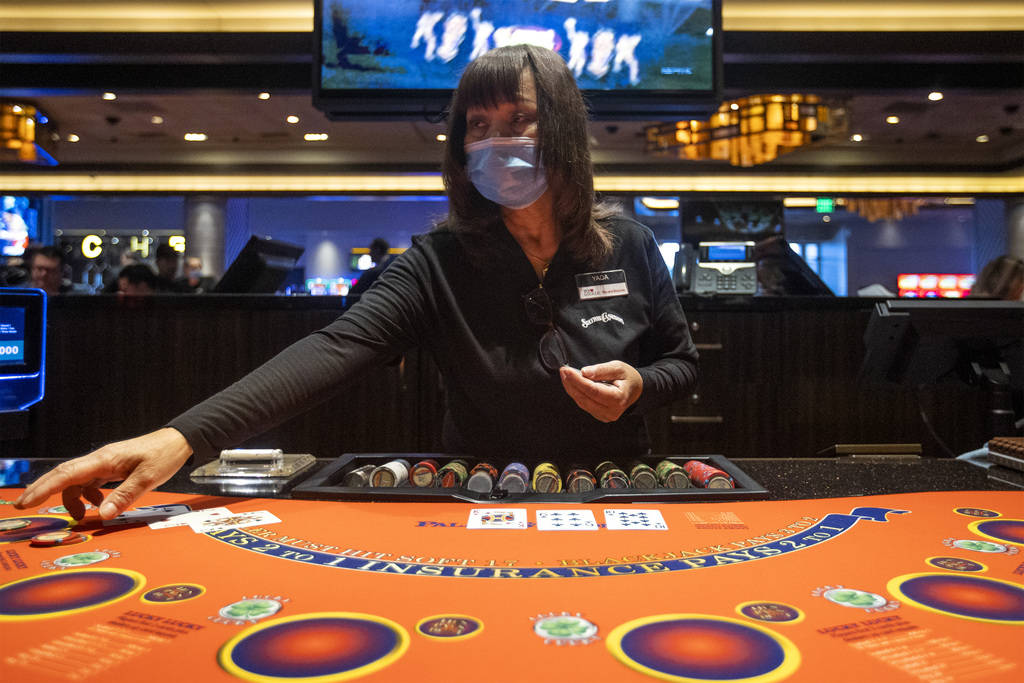What happens when a casino employee tests positive? It varies.
Last week, at least nine employees on the Las Vegas Strip tested positive for COVID-19, prompting a mix of responses from companies.
Some immediately shut down the venue where the employee worked. Others kept operations going, and declined to share information, such as which department the worker had staffed.
Every hotel-casino that discovers a positive COVID-19 test among its staff must contact the Southern Nevada Health District. It’s up to each casino operator and health district to determine what to do, if anything, after that.
“It really comes down to evaluating each individual case,” said Brian Labus, an assistant professor in epidemiology and biostatistics at UNLV and a member of the medical team advising Nevada Gov. Steve Sisolak. “Every situation is unique.”
A mix of responses
Hotel-casinos that have an employee who has tested positive for COVID-19 should first reach out to the Southern Nevada Health District to decide the appropriate course of action, Labus said.
The health department is in charge of contact tracing, which involves notifying those who had close contact with infected individuals so they can self-quarantine and prevent further spread of the disease.
While the casinos can help the department by providing time sheets and other information about the employee, Labus said the health department is responsible for the tracing by law.
“There’s an important reason for that: The employee only spends part of their day at work,” he said. “Any time there’s an outbreak or places that need to be investigated, it’s always a collaboration between the business and the health district.”
After notifying the health district, company reaction to infected employees varies greatly.
Labus said casinos may not have to take further action in some cases, such as if an employee was out for the day and there was no risk for exposure.
Other cases warrant more extreme reactions; MGM Resorts International, for instance, temporarily closed the Mayfair Supper Club at Bellagio when it discovered a kitchen worker tested positive.
The closure of a venue can be a good idea, Labus said, but it isn’t necessary in all cases.
“If a single person is sick in a venue, it’s probably not necessary to close it down,” he said. “We didn’t do that at grocery stores, we didn’t do that with Walmarts and similar cases. If that were the case, everything in Southern Nevada would be shut down.”
Health experts had recommended people with potential exposure to the virus self-quarantine for two weeks in early March, but guidelines have since softened. Now, the Centers for Disease Control and Prevention recommends only those who are in close contact with an infected individual — within 6 feet for an extended period of time — self-quarantine.
Labus said the guidance has shifted because scientists now know more about how COVID-19 spreads.
“We can be more nuanced in our decisions because we know more about the virus,” Labus said. “Simply passing someone else doesn’t put you at risk.”
He added that new protocols such as social distancing and mask requirements have led to less severe quarantine recommendations, since these actions lower the risk of spreading the virus.
Company plans
Various casinos have come up with their own response plans to COVID-19-positive employees.
Las Vegas Sands spokesman Keith Salwoski said shutting down a venue “could be included” in the company’s response.
If a Sands employee is determined to have been exposed to someone presumptive positive or positive for COVID-19 through contact tracing, the worker will be contacted by management and directed on how to get tested for the virus and self-quarantine. Salwoski said the company is also providing ongoing testing of staff in guest-facing positions. He did not address whether workers would be told to stay home for two weeks, and whether they would receive pay if so.
Caesars Entertainment Corp. said upon learning an employee or guest has tested positive for COVID-19, it uses surveillance and investigators to determine who, if anyone, has been in “close proximity” with the infected person — 6 feet or closer for 10 minutes or longer.
Employees who match the criteria are required to stay away from work for two weeks, with pay, and may return after providing proof of a negative COVID-19 test, spokesman Richard Broome said.
If an employee or guest at an MGM Resorts property tests positive for the virus, the company’s health and safety plan says it will provide the infected individual with access to medical treatment, disinfect exposed areas and, when possible, notify those who may have come in close, prolonged contact with the individual. The company said an employee who tests positive will receive two weeks of paid time off.
Representatives for Station Casinos, Boyd Gaming Corp. and Wynn Resorts Ltd. did not respond to requests for comment.
Plans can be thrown out
Despite companies working to prepare themselves for positive cases, Labus said plans may have to be cast aside in certain scenarios.
“Each of these cases is investigated by the health district, so they may decide a different course of action is better than the one recommended by the casino,” he said. “The health district has to make the final decision on how to protect the public.”
So far, reports of COVID-19-positive staff have emerged from Bellagio, the Flamingo, Sahara Las Vegas, The Linq Hotel and The Cosmopolitan of Las Vegas.
The Review-Journal is owned by the family of Las Vegas Sands Corp. Chairman and CEO Sheldon Adelson.
Contact Bailey Schulz at bschulz@reviewjournal.com or 702-383-0233. Follow @bailey_schulz on Twitter.








































